- Published on
Apollo에서 Authentication 인증하기 💫
- Authors

- Name
- Haneul Lee

Apollo에서 Authentication 인증하기 💫
authLink
백엔드에서 role기반(Host, Listener, Any)의 권한부여를 작업했기 때문에 클라이언트에서도 마찬가지로 서버에게 유저 정보에 대해 알려줘야 합니다.
import { ApolloClient, createHttpLink, InMemoryCache, makeVar } from '@apollo/client'
import { LOCALSTORAGE_TOKEN } from './constants'
import { setContext } from '@apollo/client/link/context'
const token = localStorage.getItem(LOCALSTORAGE_TOKEN)
export const isLoggedInVar = makeVar(Boolean(token))
export const authTokenVar = makeVar(token)
const httpLink = createHttpLink({
uri: 'http://localhost:4000/graphql',
})
const authLink = setContext((_, { headers }) => {
return {
headers: {
...headers,
'x-jwt': authTokenVar() || '',
},
}
})
export const client = new ApolloClient({
link: authLink.concat(httpLink),
cache: new InMemoryCache({
typePolicies: {
Query: {
fields: {
isLoggedIn: {
read() {
return isLoggedInVar()
},
},
token: {
read() {
return authTokenVar()
},
},
},
},
},
}),
})
위처럼 authLink에 setContext를 넘겨줘서 기존의 httpLink과 연결시켜주면 됩니다.
apollo client에서 Context Link를 사용합니다.
위 코드와 같이 설정을 해주면 이제 request header에는 x-jwt라는 키값에 인증 토큰이 들어가게 되고,
서버에서는 위 토큰을 받아서 유저 정보를 파악할 수 있게 됩니다.
그래서 Role 기반 권한부여를 구현할 수 있게 됩니다.
팟캐스트 & 에피소드 렌더링
apollo client의 useQuery 훅을 이용하면 쉽게 구현이 가능합니다.
useQuery는 함수는 쿼리어(gql)과 옵션 값을 입력 받아, 서버에 전달하여 query 문에 대한 결과 값을 가져옵니다.
useQuery는 data, loading, errors를 리턴해줍니다.
그 외에도 refetch와 fetchMore 등이 있습니다.
useQuery의 결과 값으로 솔루션에서는 podcast의 배열 값을 받습니다.
그 배열값을 javascript의 Array.map을 이용하여 렌더링 합니다.
참고: https://d2.naver.com/helloworld/4245995,
apollo-hooks로 refetch시키기,
